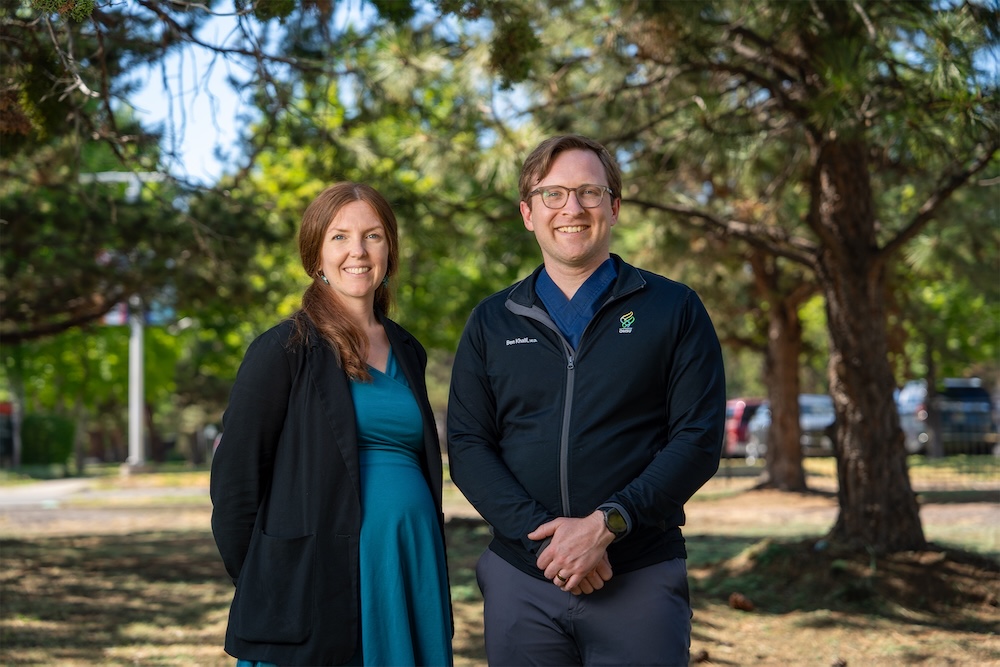Sports
Rural Doctors Gain Vital Experience in Madras Residency Program

The first cohort of the Three Sisters Rural Track Program is now gaining invaluable experience in rural medicine in Madras, Oregon. Dr. Callie Krewson and Dr. Ben Khalil are participating in this innovative residency program, which combines training at the Oregon Health & Science University in Portland with hands-on experience in local healthcare facilities. This partnership between St. Charles Health System and OHSU aims to prepare future physicians for the unique challenges of practicing in rural communities.
The first year of the residency was spent at OHSU, where the physicians laid the groundwork for their medical training. Now, they are immersed in the realities of rural healthcare, treating patients at the St. Charles Madras Family Clinic and the Mosaic Community Health Center. This program is the first of its kind in Central Oregon, designed to foster a passion for rural medicine among new doctors while addressing the region’s pressing healthcare needs.
Dr. Jinnell Lewis, a family care physician at St. Charles Madras, emphasized the benefits of smaller programs in critical access hospitals. “Having one-on-one training with a physician allows students to perform procedures and gain autonomy,” she explained. This personalized approach not only enhances learning but also cultivates a sense of community among healthcare providers.
The program’s significance extends beyond individual training. According to Robert Duehmig, OHSU’s director of the office of rural health, retaining physicians in rural areas is crucial for sustaining healthcare access. “Typically, a doctor will stay within 100 miles of where they train,” he noted. This residency aims to root healthcare professionals in Central Oregon, addressing a significant workforce shortage.
Madras faces a “desperate” need for healthcare providers, which makes partnerships like this essential, though challenging due to costs. Duehmig remarked, “It’s a great example of what can happen when organizations collaborate to provide training solutions.” He highlighted that shared resources can alleviate the financial burden on individual institutions.
The importance of training rural physicians is underscored by the anticipated national shortage of primary care doctors. According to Franny White, a spokesperson for the Oregon Health Authority, the country may face a deficit of over 87,000 physicians by 2037. Furthermore, a 2025 statewide needs assessment revealed that rural areas in Oregon experience a higher unmet healthcare need compared to urban centers.
As Krewson and Khalil develop their skills, they are also addressing the specific challenges faced by patients in rural settings. Patients often travel long distances for care, which can deter them from seeking medical attention. White noted that limited resources in rural areas exacerbate the difficulty of recruiting and retaining healthcare professionals.
Training in a rural environment often provides opportunities that urban settings cannot. “In rural settings, there is more you can be responsible for when there are fewer specialists,” said Dr. Lewis, who also trained in a rural area. She believes this experience helps cultivate physicians who are more adaptable and equipped to handle diverse medical situations.
Krewson, now living in Madras with her husband, has fully embraced her role in rural medicine. “I am very outdoorsy, and I like the access to open spaces,” she said. Her experiences have allowed her to connect with communities beyond Madras, including those in Warm Springs and John Day. She appreciates the autonomy and sense of belonging that comes from working in a smaller community hospital, describing it as a “family-run hospital.”
Khalil, who grew up in Eastern Washington, finds comfort in the small-town atmosphere of Madras. “There are different stores here where you can find things,” he said, highlighting the community’s unique charm. Both residents express enthusiasm for their training and the impact they can have on the local population.
The Three Sisters Rural Track Program aims to produce approximately 23 physicians over the next decade, potentially providing care for 20,000 to 40,000 patients in Central Oregon. With the ongoing commitment to train and retain healthcare providers in rural areas, the program sets a precedent for future initiatives aimed at addressing healthcare disparities.
As Krewson and Khalil continue their residency, they represent the next generation of healthcare professionals dedicated to serving rural communities. Their journey underscores the importance of tailored training programs in ensuring that communities like Madras have access to quality healthcare.
-

 Lifestyle3 months ago
Lifestyle3 months agoLibraries Challenge Rising E-Book Costs Amid Growing Demand
-

 Sports3 months ago
Sports3 months agoTyreek Hill Responds to Tua Tagovailoa’s Comments on Team Dynamics
-

 Sports3 months ago
Sports3 months agoLiverpool Secures Agreement to Sign Young Striker Will Wright
-

 Lifestyle3 months ago
Lifestyle3 months agoSave Your Split Tomatoes: Expert Tips for Gardeners
-

 Lifestyle3 months ago
Lifestyle3 months agoPrincess Beatrice’s Daughter Athena Joins Siblings at London Parade
-

 World3 months ago
World3 months agoWinter Storms Lash New South Wales with Snow, Flood Risks
-

 Science3 months ago
Science3 months agoTrump Administration Moves to Repeal Key Climate Regulation
-

 Science2 months ago
Science2 months agoSan Francisco Hosts Unique Contest to Identify “Performative Males”
-

 Business3 months ago
Business3 months agoSoFi Technologies Shares Slip 2% Following Insider Stock Sale
-

 Science3 months ago
Science3 months agoNew Tool Reveals Link Between Horse Coat Condition and Parasites
-

 Sports3 months ago
Sports3 months agoElon Musk Sculpture Travels From Utah to Yosemite National Park
-

 Science3 months ago
Science3 months agoNew Study Confirms Humans Transported Stonehenge Bluestones









